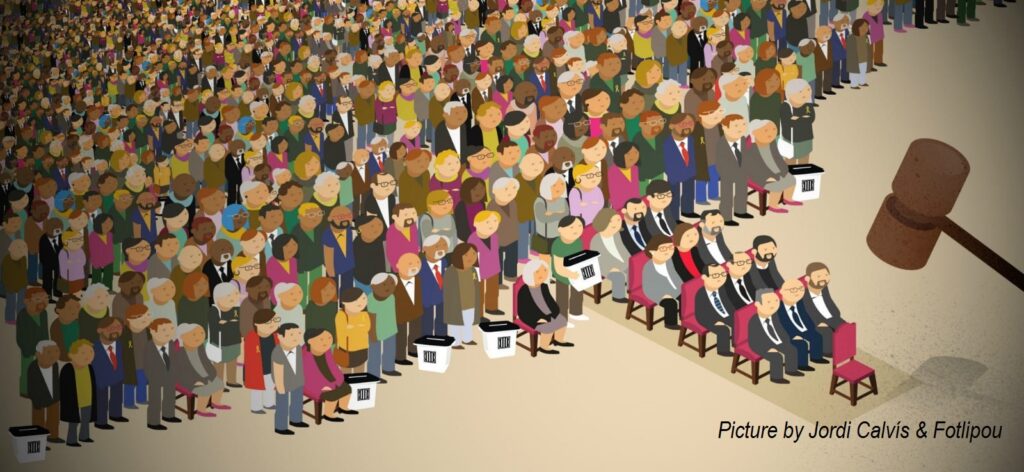by Antoni Abat Ninet, Professor of Constitutional Law, University of Copenhagen, Denmark
After 500 days of pre-trial detention, and facing charges of rebellion and sedition (among others) which carries a maximum of 30 years in prison, it found guilty, former Catalan representatives and grassroots activist had finally the possibility to be heard by the Supreme Court in Madrid. A court on which there are reasonable doubts about their competence to deal with this trial.
The trial has an enormous impact in Catalan media where the most important televisions, radio stations and digital newspapers are broadcasting live the very long sessions with a large audience. Legal experts, journalists and professionals of talk-shows comment on the questions, answers, tones, movements of all the participants. Errors of public prosecutors on dates or primary data are noted excessively, and a sort of parallel judgement seems to be performed.
Strangely, the Spanish media coverage is symbolic. Some news programs are mentioning some developments showing partial sentences and statements of the respondents and offering legal conclusions and factual perspectives that seem to back a particular position. I use the term strangely because the Catalan “issue” has been monopolising news and television talk-shows quasi-obsessively since the beginning of the trial, performing a real media circus with kafkian connotations.
So far, the trial has brought to light some systemic procedural deficiencies that the Spanish political representatives need to consider to redress to provide all possible guarantees and rights to prisoners and prosecuted. In this sense, it seems necessary to review the conditions and extent of the provisional prison. It is also required to provide means to the prosecuted to defend themselves with under basic requirements. It is hard to believe that a person is in the position to prepare a defence accurately and respond to an interrogatory of two or three hours after travelling 40-50 km from the prison to the court, without having the possibility of taking a shower, having to wake up at 06:00 am, and ending the journey at the Supreme Court at 23:30h.
The rush that can potentially cause a breach of some fundamental rights is a decision of the court to not interfering with the general elections to behold in April 28th 2019.
The public hearings, and despite the chaos of the first day, when the family members were prevented from entering for hours in the courts, it is not understandable the lack of seat reservation for international observers the motivation of public audience and broadcasting seems inappropriate,
As International Trial Watch observes. “The Supreme Court did not reserve space in the courtroom for observers which entailed long waiting hours at the Supreme Court main entrance in order to enter the courtroom. On February 12, Vox supporters organized the queue and distributed queue order numbers. On February 13 and 14 the police organized the queue requiring prior submission of ID card. The courtroom seating space can accommodate up to approximately 40 people. However, some 10 seats in the public seating area remained unoccupied in the morning sessions and a few more in the afternoon sessions. The Court will be reminded once again about the need for availability of seating space in the courtroom for observers.”. [1]
Other aspects remarked by the International Trial Watch are: “The Court did not accept to suspend the hearing as some of the Defence Counsels requested, in order to include documents which the prosecution had access to, but the parties did not. This procedural anomaly should be monitored throughout the trial in order to determine whether equal footing for both the defence and the prosecution is respected and does not become lack of proper material defence and thus a breach of article 24 in the Spanish Constitution (CE) – If a breach to the right of a judge predetermined by law (article 24.2 CE) has occurred, as most of the Defence Counsels allege, then the defendants with no political immunity will also see their right to a second level of jurisdiction breached.”.[2]
The hearings have evidence the political particularity of the trial; the Catalan representatives have continuously claimed the constitutionality of the right of self-determination and the referendum as the proper channel to solve the political conflict between Catalonia and the State. They have also insisted in the multiple failed attempts to obtain a dialogical solution to the political claim of Catalonia and the more than 51 decisions of the Constitutional Court that the Spanish government have not complied without any legal repercussion. A set of arguments that are not very usual to be heard in a Judiciary Court and the evidence the particularity of the trial. As it is unusual and unacceptable in a democratic regime, His Majesty the King of Spain, head of the State (including the secessionists) in a public speech interferes in the trial supporting the thesis of one the parties.
The international media attention that the trial has received seems to give the reason to those who have understood this process as a new possibility to explain their legal and political arguments and to expose publicly what they consider as a breach of the most fundamental rights. The trial has just begun, and the fact that His Excellency the President of the Supreme Court Manuel Marchena, referred in his first statement to the legal acquis of the European Court of Human Rights is not by chance.
(Picture by Jordi Calvís & Fotlipou)
[1] https://internationaltrialwatch.org/wp-content/uploads/2019/02/18.02.2019-Comunicado-de-prensa_Valoraciones-del-Juicio-1-0-Semana-1-eng.pdf
[2] Ibid
